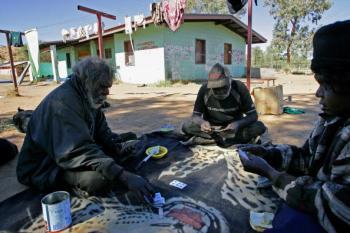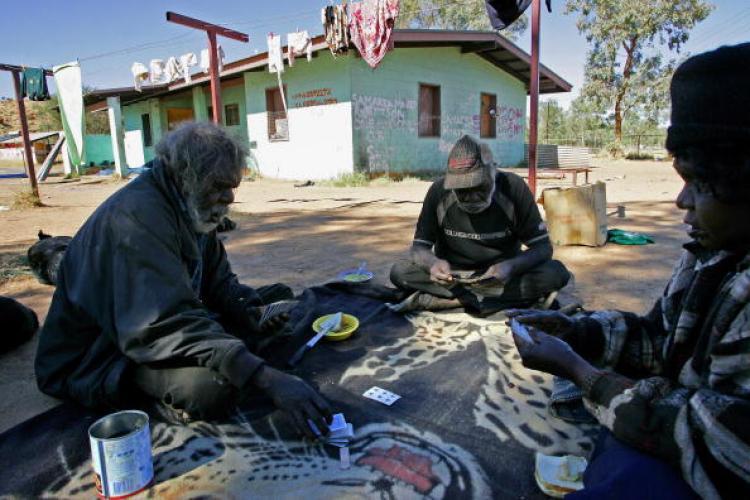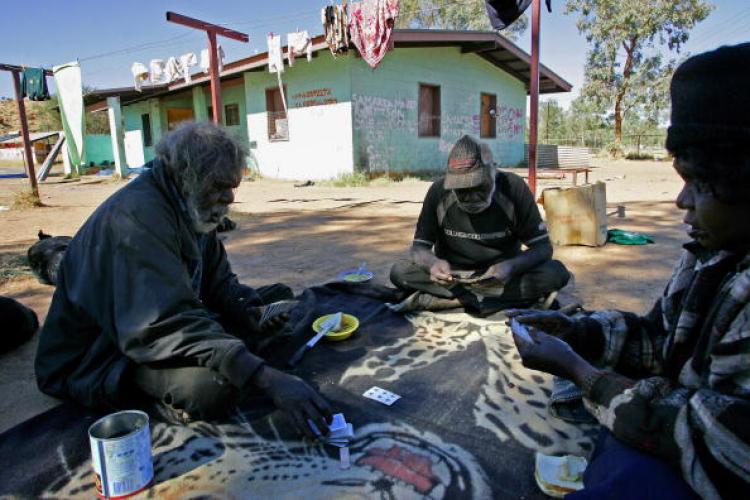SYDNEY—The Australian Government is endeavouring to improve housing and conditions for people in the town camps of Alice Springs but critics of their approach say unless indigenous people are included in the development and implementation of the plan, the mistakes of past governments would only be repeated.
The Rudd Government has allocated $672 million dollars to improve housing in the Northern Territory, promising 750 new homes and 2500 refurbishments. Of that around $138 million has been allocated to the 18 town camps surrounding Alice Springs.
Ben Schokman, a human rights lawyer representing town camp residents opposed to the terms of the proposed 40-year-lease, says the government should be “commended” for its considerable investment, as town camps have been in a state of disrepair for years, with little spent from either the Northern Territory administration or local councils.
However it is the lack of indigenous involvement in the development and implementation that is of concern, he said.
“If you look at the history of successive government approaches here in Australia, let alone evidenced all round the world in terms of government practice towards indigenous people, if you don’t involve aboriginal people, indigenous people, in both the development of and implementation of those policies, then they are just not going to be successful,” he said.
Government expenditure is conditional on two key restrictions – that the government obtains secure land tenure through 40 year leases, and that it takes control of the way services are provided.
Mr Schokman, who works at the Human Rights Law Resource Centre, said the current policy breaches the two most important concerns of indigenous people.
“The two rights which are most fundamental to aboriginal people are land rights and rights of self determination,” he told The Epoch Times. In undermining these two rights, the government’s approach is likely to affect the “the realisation of a whole range of other rights,” Mr Schokman said, including “housing, education, health and political participation”.
Minister for Indigenous Affairs, Jenny Macklin, says she has been frustrated by delays in implementing the housing plan but her government is committed to “the transformation plan in Alice Springs.”
“Living conditions in the town camps are appalling and I will not give up on the residents,” she said in a statement.
“The sticking point is the government’s insistence that control of all housing in the town camps be handed over to the Northern Territory Housing Authority, which has a bad record on delivering public housing to Aboriginal people and which is simply not trusted by town camp residents,” she said in a statement.
Jenny Macklin conceded there were concerns, but is refusing to back down saying the NTHA is responsible for tenancy management in the region.
“We are working in partnership with the Northern Territory government but we have recognised the need to put Commonwealth officers on the ground to ensure we deliver,” she told the ABC.
Ben Schokman said the NTHA leasing agreements were not sensitive to indigenous culture, citing a number of examples.
One local was evicted from NTHA housing after returning from 13 days away on sorry business (a death in the family). It is a breach of the tenancy agreement to be away from their houses that long without giving authorities notice, he said.
Another local was evicted for having a fire outside in the yard, even though it is traditional to sit outside around the fire.
Another was threatened with eviction after her elderly mother came to stay. The mother, who lived 200 kilometers away had to travel to Alice Springs to use her basics card. Under a NTHA lease, it is forbidden to have anyone staying that is not on the lease, he said.
Mr Schokman said such strict conditions would have a significant impact on Alice Springs town camps residents who have been used to self-management. In addition, providing housing which is culturally inappropriate ends up driving indigenous people back out, into the surrounds, which is how town camps began in the beginning, and which is starting to happen again as a result of evictions, he said.
Negotiations are usually done the ‘white fella way’ a process most indigenous people find intimidating. “Even the language of negotiation is problematic,” he said.
Government officials say they are open to communication or comment and to just write an email, but most houses in the town camps do not even have running water, let alone electricity, he added.
Negotiating with indigenous communities could be slow, complex and frustrating but unless efforts were made to find a common ground of cooperation, the cycle would be repeated.
The Rudd Government has allocated $672 million dollars to improve housing in the Northern Territory, promising 750 new homes and 2500 refurbishments. Of that around $138 million has been allocated to the 18 town camps surrounding Alice Springs.
Ben Schokman, a human rights lawyer representing town camp residents opposed to the terms of the proposed 40-year-lease, says the government should be “commended” for its considerable investment, as town camps have been in a state of disrepair for years, with little spent from either the Northern Territory administration or local councils.
However it is the lack of indigenous involvement in the development and implementation that is of concern, he said.
“If you look at the history of successive government approaches here in Australia, let alone evidenced all round the world in terms of government practice towards indigenous people, if you don’t involve aboriginal people, indigenous people, in both the development of and implementation of those policies, then they are just not going to be successful,” he said.
Government expenditure is conditional on two key restrictions – that the government obtains secure land tenure through 40 year leases, and that it takes control of the way services are provided.
Mr Schokman, who works at the Human Rights Law Resource Centre, said the current policy breaches the two most important concerns of indigenous people.
“The two rights which are most fundamental to aboriginal people are land rights and rights of self determination,” he told The Epoch Times. In undermining these two rights, the government’s approach is likely to affect the “the realisation of a whole range of other rights,” Mr Schokman said, including “housing, education, health and political participation”.
Minister for Indigenous Affairs, Jenny Macklin, says she has been frustrated by delays in implementing the housing plan but her government is committed to “the transformation plan in Alice Springs.”
“Living conditions in the town camps are appalling and I will not give up on the residents,” she said in a statement.
NT Housing Authority Not Trusted
Greens Senator, Rachel Siewert, said she was concerned the government was going to hand over control of housing to the Northern Territory Housing Authority (NTHA) , even though there were a number of proven alternatives.“The sticking point is the government’s insistence that control of all housing in the town camps be handed over to the Northern Territory Housing Authority, which has a bad record on delivering public housing to Aboriginal people and which is simply not trusted by town camp residents,” she said in a statement.
Jenny Macklin conceded there were concerns, but is refusing to back down saying the NTHA is responsible for tenancy management in the region.
“We are working in partnership with the Northern Territory government but we have recognised the need to put Commonwealth officers on the ground to ensure we deliver,” she told the ABC.
Ben Schokman said the NTHA leasing agreements were not sensitive to indigenous culture, citing a number of examples.
One local was evicted from NTHA housing after returning from 13 days away on sorry business (a death in the family). It is a breach of the tenancy agreement to be away from their houses that long without giving authorities notice, he said.
Another local was evicted for having a fire outside in the yard, even though it is traditional to sit outside around the fire.
Another was threatened with eviction after her elderly mother came to stay. The mother, who lived 200 kilometers away had to travel to Alice Springs to use her basics card. Under a NTHA lease, it is forbidden to have anyone staying that is not on the lease, he said.
Mr Schokman said such strict conditions would have a significant impact on Alice Springs town camps residents who have been used to self-management. In addition, providing housing which is culturally inappropriate ends up driving indigenous people back out, into the surrounds, which is how town camps began in the beginning, and which is starting to happen again as a result of evictions, he said.
Culturally Insensitive
Mr Schokman said more effort could be made to be culturally sensitive around a whole range of issues including basic negotiation.Negotiations are usually done the ‘white fella way’ a process most indigenous people find intimidating. “Even the language of negotiation is problematic,” he said.
Government officials say they are open to communication or comment and to just write an email, but most houses in the town camps do not even have running water, let alone electricity, he added.
Negotiating with indigenous communities could be slow, complex and frustrating but unless efforts were made to find a common ground of cooperation, the cycle would be repeated.






